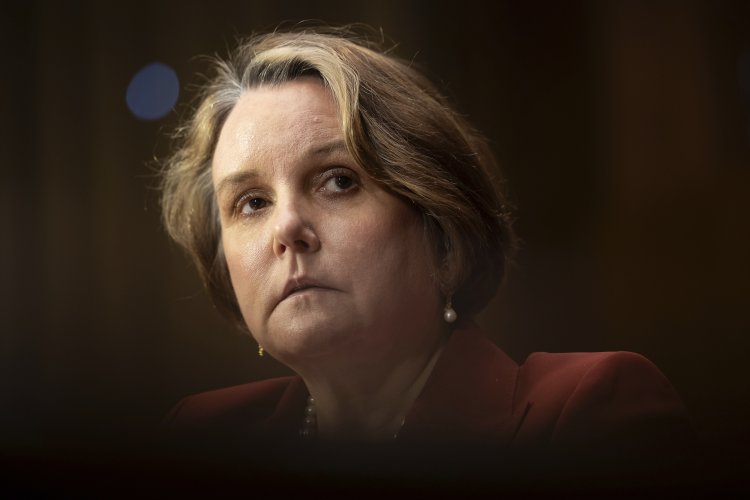The Female Decision-Maker Central to Trump's Major Big Tech Clampdown
Gail Slater, leading the DOJ's antitrust division, will illustrate the extent of the right's commitment to holding big tech companies accountable.

Highlighting the importance of the moment, Slater introduces one of the panelists. “As the great Stephen K. Bannon would say to his audience,” she quotes the former Trump adviser, “it’s time for action, action, action.”
Next, Slater hands the microphone to Brendan Carr, chair of the Federal Communications Commission, who discusses the government's role in dismantling what he refers to as the “censorship cartel.” “Thank you, Brother Carr,” she acknowledges before passing it to Andrew Ferguson, the assertive new chair of the Federal Trade Commission (FTC), who criticizes the concentrated power that he claims allows “the truly terrifying Silicon Valley elites” to censor speech.
“I often hear the criticism that what I’m describing is not a, quote, traditional concern of antitrust, end quote,” Ferguson responds emphatically, asserting, “Yes, it is, yes, it is. Of course it is.”
“That’s another amen from me,” agrees Slater.
This atmosphere marks a distinct shift for Republicans in Washington, particularly in their approach to antitrust matters. Traditionally, they have favored a more lenient stance on corporate regulations, a tendency that was largely upheld until Trump’s presidency. For example, a 2006 Washington Post headline during George W. Bush’s administration noted, “Washington is antibust.” While Trump initially showed little enthusiasm for aggressive antitrust actions against major tech firms, he did take notable steps toward the end of his first term, including a DOJ lawsuit against Google for alleged unfair competition in the search market.
Slater's trajectory illustrates a change within conservative ranks, as she transitions from a traditionally business-friendly approach to leading a movement that is skeptical of monopoly power. Recognized as both a diligent enforcer and a bipartisan collaborator, she is now positioned at the forefront of the revitalized MAGA antitrust initiative, managing cases against tech giants like Google and Apple.
Despite her refusal to comment for this article, Slater’s recent forum indicated her alignment with the belief among MAGA supporters that large tech companies are undermining personal freedoms, particularly for individuals with opposing political views.
Trump himself has echoed these sentiments. “Big Tech has run wild for years,” he remarked on his Truth Social platform when announcing Slater’s nomination after personally interviewing her. Critics argue that Trump’s motivations stem from personal grievances against companies he feels have wronged him. For instance, he attempted to impose restrictions on tech companies’ liability just days after social media platforms flagged his posts.
These dynamics create a complex environment for Slater as she navigates her mandate to curb Silicon Valley’s influence. This requires her to craft strong legal arguments to challenge concentrated corporate power while distancing her initiatives from the appearance of political retaliation stemming from Trump’s vendettas against the industry.
Supporters of Slater dismiss concerns about political bias in the enforcement of antitrust laws. “Claims about the politicization of antitrust enforcement are evergreen,” points out Roger Alford, her deputy. However, there are skeptics who worry about the implications of Trump’s unpredictable commentary on tech companies. “I think a big challenge for Gail is, how impulsive will the president be?” questions William Kovacic, a former FTC chair.
Slater's legal philosophy had remained somewhat obscure until her confirmation hearing and subsequent public remarks. Emigrating from Dublin in the early 2000s, she began her legal career at the FTC, where she fostered connections with those highlighting the need for scrutiny of Silicon Valley’s power. However, her advocacy shifted after the 2016 election when there was bipartisan concern over tech platforms influencing election narratives and mishandling online harassment issues.
Slater faced considerable scrutiny during her time with the Internet Association while testifying against legislation intended to combat sex trafficking. Referring to her experience with the group, she noted their “foot dragging” in addressing increasing oversight from Washington and chose to leave in 2018.
Following her departure, she joined the Trump administration, where she concentrated on technology and telecommunications policy, emphasizing the need for an accelerated rollout of high-speed wireless technologies amid competition with China. Nevertheless, this period also saw Trump leverage antitrust powers against companies he believed were punitive towards him.
Slater’s return to antitrust work in 2022 at Roku found her advocating against prominent tech companies, bolstering arguments for legislation to limit their power, even as she acknowledged past allegiances. As the conservative backlash against Silicon Valley intensified through the pandemic and subsequent elections, Slater’s views on free speech and antitrust began to converge.
During her confirmation testimony, Slater expressed concern about the ramifications of concentrated online platforms on free speech, signaling her alignment with emerging antitrust critiques. A conversation surrounding this perspective has developed into concepts like “MAGA Antitrust” and “America First Antitrust,” with Slater emphasizing the need for antitrust to represent the interests of ordinary Americans.
In her recent statements at a censorship panel, Slater highlighted the sociocultural implications of tech influence, referencing Andrew Breitbart’s assertion about the relationship between culture and politics. Her recommendations for readings, such as “The Revolt of the Public” by Martin Gurri, indicate her interest in the intersection of technology and societal change.
Following her tenure at Roku, Slater re-engaged with antitrust issues as Trump assumed office again, taking on a range of high-stakes cases. Notably, she leads the case against Google, which accuses the company of anticompetitive behavior, and attempts to show that its practices are actually harming competition.
As she prepares for the court's decisions regarding antitrust policies, she faces the challenge of establishing her efforts as legally sound and unobstructed by Trump’s personal grievances. Her ability to successfully navigate these legal waters may define not only her tenure but also the future of antitrust enforcement in the U.S.As Slater embarks on her high-stakes legal battles, the eyes of both allies and critics are fixed on her. A central focus remains the antitrust case against Google, launched under the previous administration but now poised to set significant legal precedents. The complexities of this case reflect Slater’s delicate balancing act: proving that Google has engaged in monopolistic behavior without appearing to leverage political grievances.
In late April, the trial commenced, marking a pivotal moment for Slater and her team. The arguments revolve around whether Google has perpetuated its dominance in the search market through unfair practices, particularly the claim that it pays phone manufacturers to set its search engine as the default. This “vicious cycle,” as Slater’s team describes, presents the challenge of proving that such actions not only harm competitors but also consumers and the market as a whole.
The potential ramifications of this case stretch beyond the courtroom. A favorable outcome could embolden further actions against other tech giants while reinforcing the notion that antitrust laws can act as a counterbalance to corporate power. Conversely, a defeat could significantly undermine Slater’s standing and the broader antitrust initiative within the Trump administration, potentially leading to a perception of ineffectiveness.
As Slater navigates this landscape, the dynamic relationship with Trump becomes increasingly critical. His propensity to comment on legal matters — often in ways that could be interpreted as politically motivated — poses a risk to the impartiality needed in her cases. Observers recall past instances from Trump’s presidency where his remarks undermined legal strategies, leading to unfavorable outcomes in various lawsuits.
Amidst these challenges, Slater’s allies articulate their confidence in her approach and oversight. They see her as a pragmatic choice given her background and her willingness to engage with both sides of the aisle on antitrust issues. “Gail Slater’s key to that,” Bannon insists, reflecting a growing belief among some that she can bridge political divides surrounding antitrust concerns.
Yet, the reality of balancing political influence with legal integrity remains a tightrope walk. As Slater continues to push forward with litigation against tech companies, she draws from her extensive legal experience and knowledge of antitrust laws. Her career trajectory highlights a shift from supporting tech interests to holding them accountable, aligning her with a broader movement on the right that demands greater scrutiny of Silicon Valley’s practices.
The stakes could not be higher, not just for Slater but for the future of antitrust enforcement in the United States. The outcomes of these cases will shape the regulatory landscape and potentially redefine the relationship between technology companies and the government. If successful, Slater could redefine what it means to enforce antitrust laws in a digital age where technology giants hold unprecedented power over information, communication, and commerce.
As the trial progresses, those within and outside the administration will be closely watching. The impact of Slater’s actions will echo throughout the tech industry and the political spectrum, influencing not just legal precedents but also the way policymakers engage with corporate power moving forward. Slater will need to navigate this complex environment with strategic foresight, cultivating legal arguments that withstand scrutiny while remaining firmly rooted in the principles of antitrust enforcement.
By the end of May, as closing arguments loom, the anticipation mounts regarding the judge's anticipated ruling in August. As she stands at this pivotal crossroads, Slater will leverage her legal expertise and understanding of the antitrust landscape against not only the formidable corporate defenses but also the political undercurrents that shape this unique moment in American regulatory history. The outcome of her efforts will be critical in forging a path forward for antitrust policy and its application in an era increasingly dominated by the likes of Google, Apple, and other tech giants. The question remains: will she emerge victorious, or will the challenges, both internal and external, be too formidable to overcome? The answer could redefine the future of technology regulation in the United States for years to come.
Max Fischer for TROIB News












